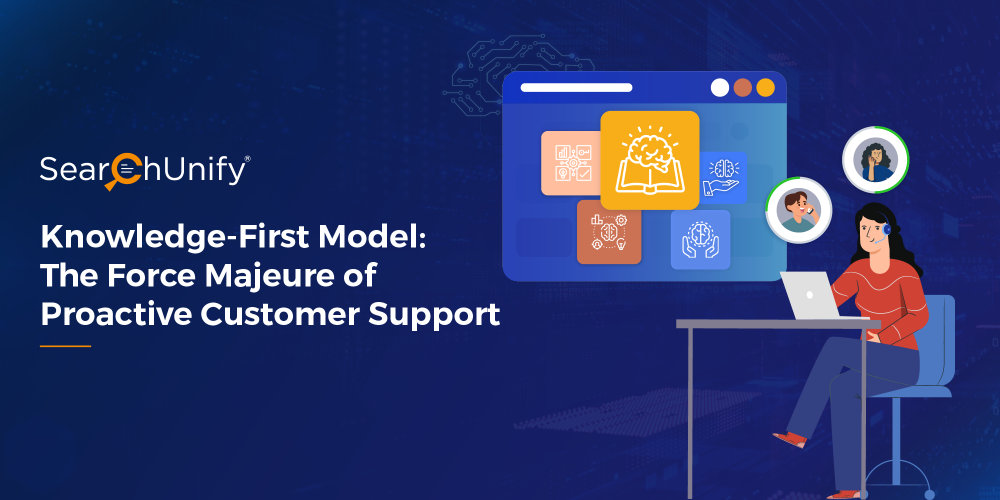

Most organizations today are flooded with copious data, irrespective of type and size. But, what’s the point if end-users are served with static, potentially outdated, and irrelevant information? This is where a knowledge-first model kicks in.
The knowledge-first approach lays emphasis on capturing and leveraging enterprise knowledge to provide stellar end-to-end customer experiences while lowering support costs and preventing agent burnout. What’s more, it ensures that the right knowledge reaches the right people as quickly as possible so that customers don’t feel neglected and agents perform at full throttle.
In an earlier post, we discussed why the transition from case-first to knowledge-first is crucial and what’s stopping organizations from making the indispensable switch. In this blog post, we’ll discuss how you can build sustainable customer support by adopting a knowledge-first approach with AI at its helm. Let’s get rolling.
Adding ‘Proactive’ to Customer Support with Knowledge-First Model
A knowledge-first model equips your support teams with proactiveness, thereby empowering them to resolve issues even before they occur. By and large, it helps you improve your support ROI. Here’s how.
1. Boosts Customer Retention Rates
Proactive customer service deepens customer relationships by making them feel seen and valued. This way, they are likely to stick around with you for a longer duration, which in turn increases customer loyalty and retention.
Fun Fact: Acquiring a new customer is five times as expensive as retaining an existing one.
2. Empowers Support Agents
Regardless of how well acquainted your support agents are with the products and services, they need access to proper documentation, case notes, and user journey to resolve customer issues promptly. A knowledge-first approach provides a 360-degree view of enterprise knowledge from across disparate repositories to equip agents with case resolving data and empower them with efficient resolution handling.
Fun Fact: According to Help Scout, being more responsive and more effective at resolving issues correlates with improved customer satisfaction and loyalty.
3. Reduces Customer Complaints
In the self-service era where customers prefer resolving issues on their own than waiting on hold, a knowledge-first model can work wonders. It captures and gleans actionable insights from historical user data to help you create more relevant self-help content on your portal. The more your customers self-serve, the fewer complaints your support teams receive. This way, you don’t just make unhappy customers happy, but also turn them into your brand advocates.
Fun Fact: According to a Salesforce survey, 89% of millennial use a search engine to find answers before making a call to get customer service
4. Curbs Escalations
If an agent is not equipped with the right information, then the customer query is likely to escalate to a more experienced and specialized agent. However, with a centralized, comprehensive knowledge base, even a newbie can resolve the query with confidence as they get a sneak peek into past resolved cases; thus getting a better grasp of the issue before they attempt to resolve it.
Fun Fact: Escalated cases cost 10-20 times more than an average case.
Imbue AI for Seamless Transition from Case-First to Knowledge-First
Moving from a reactive, case-first model to a proactive, knowledge-first model is easier said than done. However, AI never fails to work its magic. Let’s see how:
- Empowers Customers to Self-Serve: Organizational information is often scattered across KBs and platforms. That means looking for it could be equivalent to finding a needle in a haystack. This is where AI plays a crucial role. It integrates disparate data repositories to provide a unified view of the enterprise knowledge to your customers and employees. This way, customers can resolve basic queries by themselves while the agents work on helping disgruntled customers before it’s too late.
- Ensures Personalization: Customers have become accustomed to getting everything at their disposal with minimal effort. That is why they gravitate towards brands that recognize their individual needs at every stage of the journey and deliver a personalized CX. Here again, AI helps to track historical user data to provide insights into preferences and intent so that you can deliver hyper-personalized experiences.
- Provides Round the Clock Service: AI is now closer than ever to mimicking the human brain. Thus, you can pass the baton to intelligent chatbots at odd hours or whenever your team cannot be around to ensure help is available 24/7. This way, your customers can get help at any time, in any language, and on any device they use.
Want to Seamlessly Embrace Knowledge-First Model?
Then, join Phil Verghis, CEO, Klever Insight, and Alok Ramsisaria, CEO, Grazitti Interactive, for a live webinar on September 15, 2021, at 10:00 AM PST. They’ll discuss how the right blend of technology and strategy can help you build sustainable customer support with a knowledge-first model.
Register now to unleash the secrets behind sustainable customer support from the leader who coined the term ‘Knowledge first’.